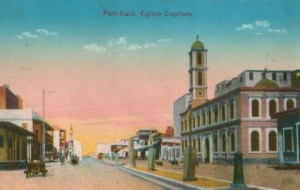Port Said: Egypt’s Statue of Liberty
 By Farah Halime, Rebel Economy
By Farah Halime, Rebel Economy
After yesterday’s deadly clashes with as many as 30 killed, it’s hard to imagine how the Port Said of today was once the object of a sculptor’s fascination.
In the 1850s, French sculptor Frederic Auguste Bartholdi planned to build what is now known as the Statue of Liberty at the entrance to the newly constructed Suez Canal at the coastal city of Port Said.
He fell in love with the colossal statues in Luxor on the Nile, the Wall Street Journal’s William McGurn wrote in February 2011 when Egypt’s revolution signified children on their parents shoulders at Tahrir Square, not masked men.
Inspired by Egypt’s granite beings, he proposed a huge statue of a robed woman. It was to be called Egypt Bringing Light to Asia:
“Like our Lady Liberty, the Egyptian version featured a woman holding aloft a torch. Like our Lady Liberty, the Egyptian woman was to stand on a large pedestal. Where ours has rays of light coming out of her crown, however, the Egyptian woman has light emanating from under a headdress.”
But the Egyptians would not pay, McGurn writes:
“Eventually Bartholdi made his way to America. Here he discovered an island off Manhattan that would make an ideal site for a grand statue. Though he would deny any relationship between the two, a comparison suggests otherwise.”

A century later, the sculptor’s instincts would be proven correct and the city would thrive on being a duty-free port and tourist resort, where people would flock to see the town’s exceptional 19th Century Italian and Greek architecture.
The city grew to become one of the richest governorates in Egypt with an economy built on fishing and industries such as chemicals, processed food and cigarettes. It was also a critical harbour for exports of Egyptian cotton and rice.
Of course, like any developing city dependant on tourism and specific industries, it faced many problems that threatened the livelihood of Port Said’s citizens, including attacks to the city’s architecture and the prospect that city’s free-zone status would end.
But a deadly brawl last February changed the image of the city forever.
A riot at a Port Said football game between rival groups of hardcore football fans from Cairo and Port Said ended with 74 people dead and 1,000 wounded.
“It was the worst soccer riot in Egyptian history and among the worst in the world,” David Kirkpatrick wrote in the New York Times. At the time there were conspiracy theories about former members of Hosni Mubarak’s regime hiring thugs to disrupt the country’s transition to democracy. But then the people of Port Said became blamed for the incident.
As if bowing to these rumours, an Egyptian court sentenced 21 people to death on charges related to the violent clashes between rival football fans last year. At least 30 more people were killed and 250 injured in Port Said over the weekend in riots sparked by the death sentences.
Most had expected an acquittal.
Today Port Said is an isolated city-state that has broken from the rest of the country, as Kirkpatrick writes:
“Egypt’s new government lost control of a major city, Port Said, on Saturday as rampaging soccer fans attacked the main jail, drove police officers from the streets and cut off all access to the city.”
The streets are lawless and residents feel more isolated than ever believing that the country has turned against them.
Port Said, a relatively well-to-do city that registers one of the highest gross domestic product per capitas among Egypt’s cities, is an example that even financial stability cannot bring comfort if a society feels targeted by the government.
Egypt’s administration, by sentencing to death 21 Port Said football fans, has driven a wedge between the residents and the capital of Cairo, which is still seen as the base of a centralised government that dictates the fate of 83 million people across Egypt.
Not only will the livelihood of Port Said’s residents suffer if that division continues, but the whole of Egypt, which relies on Port Said for important exports, imports and foreign currency from the Suez Canal.
If the state is interested in any kind of economic revival, it will have to include and involve cities like Port Said that have a rare combination of economic, historic and architectural attributes which the government would be hard-pressed to find elsewhere.




